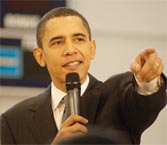Obama’s challenge is to develop an effective US-Pak partnership
 Washington, Jan. 16 : An expert on South Asian affairs has claimed that the defeat of extremist forces in South Asia has not succeeded fully due to Pakistan's ambivalence toward religious militancy, and on its reliance in the past to achieve its aims in Afghanistan and India.
Washington, Jan. 16 : An expert on South Asian affairs has claimed that the defeat of extremist forces in South Asia has not succeeded fully due to Pakistan's ambivalence toward religious militancy, and on its reliance in the past to achieve its aims in Afghanistan and India.
Calling on both the United States and Pakistan to synchronise their thoughts and policies on who the actual enemy is, Lisa Curtis, Research Fellow for South Asia at The Heritage Foundation''s Asian Studies Center, claims that while Pakistan's military leadership increasingly comprehends that these extremists can easily get out of their control and pose an existential threat to Pakistan itself, they also lack a comprehensive, bold plan to face down the threat.
The extremists, on the other hand, she says are clear on their vision, which in the short-term includes carving out a space in the tribal areas from which to plan and launch terrorist attacks.
Therefore, developing an effective U. S.-Pakistan partnership to jointly address the threat will be one of the greatest challenges facing the new Obama administration, she adds.
The outcome of the fighting in Afghanistan and whether the coalition forces can prevent the Taliban from re-gaining influence there will largely determine how safe and secure civilized nations will remain from future terrorist attacks, Curtis claims.
The Taliban terrorists and their al-Qaeda allies have taken advantage of the Karzai government's shortcomings and capitalized on the increase in civilian casualties from coalition military operations to press their agenda, she adds.
Though U. S. Predator strikes in Pakistan's tribal areas have recently been successful in eliminating several high profile terrorist targets, the fact is it will take more than technology to confront the terrorists in South Asia, Curtis believes.
It will take a concerted and multi-pronged effort that involves education, economic development, political reconciliation, and a close integration of U. S. policies toward Afghanistan and Pakistan to turn things around.
She suggests that one way to go about it is to name a high-level Pakistan-Afghanistan envoy.
"This person will have to work hand-in-glove with CENTCOM Commander General Petraeus, just as Gen. Petraeus worked so effectively with U. S. Ambassador to Iraq Ryan Crocker to help stabilize the situation there," she concludes. (ANI)